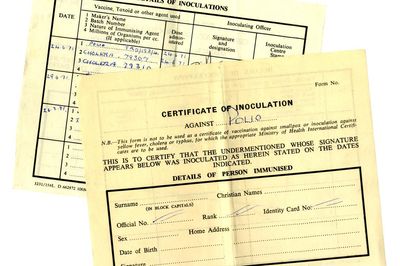Long before Covid-19 disrupted daily life and put millions of people at risk, polio outbreaks caused thousands of cases of paralysis, disability and death in the 1940s and early 1950s. With the invention of polio vaccines in the 1950s, cases dropped steadily and polio was officially gone from the Americas in the 1990s. Today, polio is gone from virtually every country.
But the polio story doesn’t end there. In July 2022, a single case appeared in an unvaccinated person in New York. Because polio is highly contagious, even just one case could possibly cause an outbreak, especially among unvaccinated people.
While we don’t know exactly how long protection from the polio vaccine lasts, there is evidence that it offers protection for decades. With the lurking threat of polio in the United States, you may be wondering if you ever received the vaccine. The U.S. has no national vaccination database, so there’s no single source to check.
How can you find out if you were vaccinated against polio?
1. Consider when you were born and where
If you grew up in the U.S. in the 1970s or later, there’s a good chance you got the polio vaccine. Polio vaccines have been part of routine childhood immunizations in the U.S. since the vaccine was approved in the mid-1950s. If you got any vaccines as a kid, polio was probably one of them. If you grew up elsewhere and emigrated to the U.S., you would have had to get a polio vaccine to move here.
2. Walk down memory lane
Do you or your parents still have a baby book or other mementos from your early childhood? You may find records that confirm what vaccinations you’ve had. If your parents are alive, ask them if you got routine vaccinations as a child. Their memory may be enough to strongly suggest that you’re protected.
3. Check your pediatric medical records
If your pediatrician’s office still operates, you can ask them for a copy of your medical records. Depending on how old you are, they may have to dig out your paper records — but they may still have them.
4. Check your state’s archives
Some states now have online registries to track vaccinations in a centralized place. They probably don’t go back far enough to help anyone in their 30s or older, but historical records may exist within state public health departments.
5. Check with the schools you attended
If your preschool or elementary school is still around, it may have records of their vaccination requirements. Most schools would have required polio vaccination. If you can confirm that your school required the polio vaccine, it’s a safe bet that you were vaccinated or you wouldn’t have been allowed to attend.
Even if you can’t go that far back, your high school or college may have required a record of your childhood vaccinations. If it required documentation of polio vaccination, that may be enough to assume that you were vaccinated.
What to do if you weren’t vaccinated against polio
If you find that you didn't get the polio vaccine, or if you’re at high risk of exposure because of your job or countries that you visit, the CDC recommends you get vaccinated now. Talk to your healthcare provider about your risks and make a plan to get protected.
- What You Need to Know About Back-to-School Vaccines ›
- 6 Common Concerns of Vaccine-Hesitant People ›
- The Dark Days Before Vaccines ›
- Lessons From How the Polio Vaccine Went From the Lab to the Public That Americans Can Learn From Today ›
- I Was a Polio Pioneer, and I Can’t Wait to Get the COVID-19 Vaccine ›


